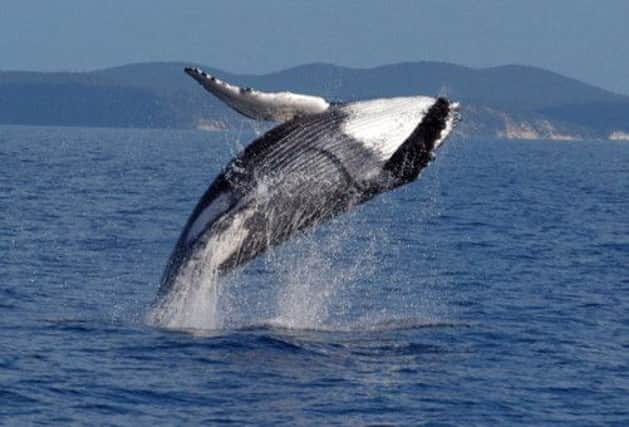Whales pass on hunting knowledge to survive change


A team headed by researchers from the University of St Andrews has discovered that a new feeding technique has spread to 40 per cent of a humpback whale population.
A community of teh species off New England, in America, was forced to find new prey after herring stocks – their preferred food – crashed in the early 1980s. The solution the whales devised to catch their new prey – hitting the water with their tails – has now spread and by 2007, nearly 40 per cent of the population had been seen using the new method.
Advertisement
Hide AdAdvertisement
Hide AdDr Luke Rendell, lecturer in the School of Biology at the University of St Andrews, said: “Our study really shows how vital cultural transmission is in humpback populations – not only do they learn their famous songs from each other, they also learn feeding techniques that allow them to buffer the effects of changing ecology.”
Dr Will Hoppitt from Anglia Ruskin University, another team member, said: “We can learn more about the forces that drive the evolution of culture by looking outside our own ancestral lineage and studying the occurrence of similar attributes in groups that have evolved in a radically different environment to ours, like the cetaceans.”
Humpbacks herd shoals of prey by blowing bubbles underwater to produce “bubble nets”. The feeding innovation, called “lobtail feeding”, involves whales hitting the water with their tails before diving to produce the bubble nets.
Lobtail feeding was first observed in 1980. As herring numbers dropped, sand lance stocks soared, and it would seem the innovation is specific to that particular prey, as its use is concentrated around the Stellwagen Bank off Massachusetts, spawning grounds where the sand lance can reach high abundance.
The researchers tracked the spread of the behaviour using a unique database spanning 30 years of observations gathered by Dr Mason Weinrich of the Whale Center of New England.
Jenny Allen, another St Andrews team member, commented: “The study … shows the central importance of long-term studies in understanding the processes affecting whale populations.”
The scientists believe their results strengthen the case that cetaceans have evolved sophisticated cultural capacities.
The skills, knowledge, materials and traditions that humans learn from each other help explain how we have come to dominate the globe as a species, but how we evolved the capabilities to transmit such knowledge between ourselves remains a mystery that preoccupies biologists, psychologists and anthropologists.
The findings were published in the journal Science.